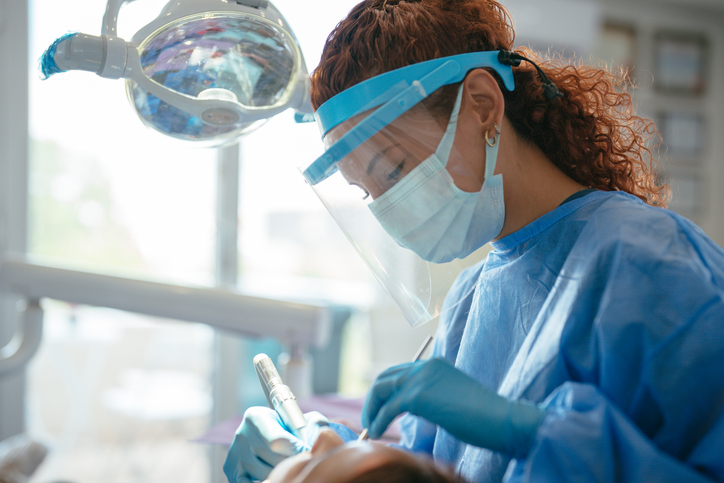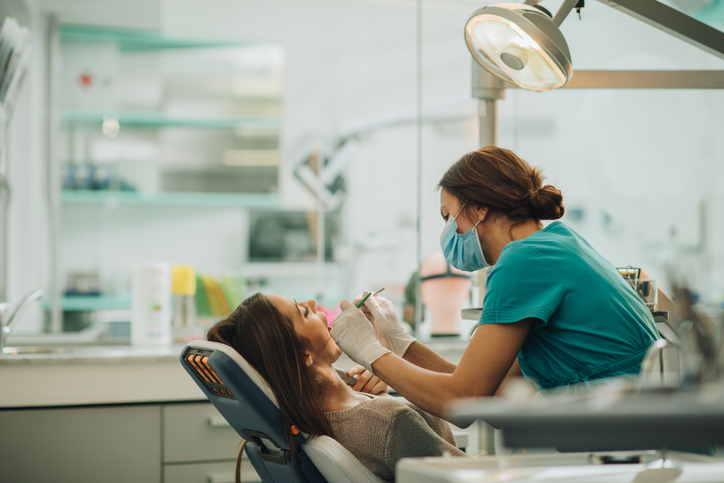Becoming a dental hygienist has many perk: stable employment, competitive salaries, and meaningful patient care work.

Dental hygienist typically earn enough to service their educational debt.
But before you dive into a dental hygiene program, it’s important to get a clear picture of what it’s going to cost:
Most dental hygienists graduate with $20,000 to $25,000 in student loan debt if they attend a public associate degree program. Those who attend private trade schools may incur $70,000 to $90,000+ in debt. Bachelor’s degree holders from public universities typically borrow $30,000 to $60,000, while private college grads may owe $65,000 to over $100,000. Choosing lower-cost programs and applying for aid can significantly reduce debt.
In the following sections, we break down what you need to know about dental hygiene program costs, average student debt, and strategies to keep your finances healthy.
Cost of Dental Hygiene Education
Factors that determine the price of a dental hygiene degree are as follows:
- public vs. private school
- if public, then in-state vs. out-of-state
- length of the program (degree type)
Associate Degree vs Bachelors Degree
Most dental hygienists earn an associate degree, but some pursue a bachelor’s for expanded opportunities. Let’s take a look at the cost variants of each degree based on school type.
Associate Degree Programs
Public Community Colleges (In-State)
For dental hygiene, the price range is $5,000–$20,000 total tuition. Below are some examples.
- College of DuPage (Glen Ellyn, IL): $17,954
- Miami Dade College (Miami, FL): $10,403.36
- Dallas College (Dallas, TX): $14,780
- Carl Sandburg College (Galesburg, IL): $20,083
- Most Affordable Example: Tyler Junior College (TX) offers a CODA-accredited online completion program for around $5K.
Private Colleges or Trade Schools
The cost for an AA degree in dental hygiene at most private institutions is at least $70,000 according per these unverified reports:
The tuition at Concorde Career college in Kansas City is reported as $86,000.
The cost is typically higher than a public institution as they have no wait lists and offer faster completion times or online classes.
Bachelor’s Degree Programs:
Public Universities
The price range is $32,000 – $68,000 for four years in state.
- University of Michigan (Ann Arbor, MI): $68,000.
- University of North Carolina at Chapel Hill: $36,000.
- University of Minnesota (Minneapolis, MN): $60,000.
Private Universities
Price range for a dental hygiene BS degree is $65K to $110K+ for four years at a private institution.
Additional Expenses
You will want to allocate at least $6,000 for the following additional expenses:
- Books and Supplies: $1,500–$3,000 per year
- Licensing Exams: National Board Dental Hygiene Exam ($400–$500), state clinical exams ($1,000–$2,000)
- Equipment/Uniforms: $500–$1,500
Strategies to Minimize Debt
As we have shown, community colleges and public universities are generally less expensive than private institutions.
Two-year associate programs typically mean less debt than four-year bachelor’s programs. Consider whether an associates degree is the best option for getting started.
Other things to consider:
- Financial Aid: Grants, scholarships, and work-study can significantly reduce out-of-pocket costs. The ADHA Institute for Oral Health and other groups offer scholarships ranging from $1,000–$2,000.
- Borrow Only What You Need: Federal loans have fixed interest rates (8.08% for unsubsidized, 9.08% for PLUS loans as of July 2024), so minimize borrowing to reduce long-term costs.
- Budget Wisely: Track your expenses, limit discretionary spending, and consider part-time dental office work for income and experience.
See our article on strategies for minimizing student loan debt.
Impact of Student Loan Debt on Dental Hygienists
The median annual salary for dental hygienists is about $94K (BLS), making loan repayment manageable if you’re thoughtful about how much you borrow, you can avoid taking on more debt than you can handle. While a large loan might limit your job options at first, most dental hygienists are able to pay off their student loans without too much financial strain.
| Education Type | Payment % of Salary | Min Debt | Max Debt | Years to Repay (Min) | Years to Repay (Max) |
|---|---|---|---|---|---|
| Public Associate Degree | 5% | $20,000 | $25,000 | 4.3 | 5.3 |
| Public Associate Degree | 10% | $20,000 | $25,000 | 2.1 | 2.7 |
| Public Associate Degree | 20% | $20,000 | $25,000 | 1.1 | 1.3 |
| Private Trade School | 5% | $70,000 | $90,000 | 14.9 | 19.1 |
| Private Trade School | 10% | $70,000 | $90,000 | 7.4 | 9.6 |
| Private Trade School | 20% | $70,000 | $90,000 | 3.7 | 4.8 |
| Public Bachelor’s Degree | 5% | $30,000 | $60,000 | 6.4 | 12.8 |
| Public Bachelor’s Degree | 10% | $30,000 | $60,000 | 3.2 | 6.4 |
| Public Bachelor’s Degree | 20% | $30,000 | $60,000 | 1.6 | 3.2 |
| Private Bachelor’s Degree | 5% | $65,000 | $100,000 | 13.8 | 21.3 |
| Private Bachelor’s Degree | 10% | $65,000 | $100,000 | 6.9 | 10.6 |
| Private Bachelor’s Degree | 20% | $65,000 | $100,000 | 3.5 | 5.3 |
Monthly Payment and Debt Stress
Understanding the monthly costs is important. For example if your debt level is $25k @6% interest, your payment would be roughly $276/mo. At $60K your payment would be approximately $663/months. With a median salary of $94,000 and average debt of $25,000, most hygienists have a debt-to-income ratio under 30%, which is considered financially healthy. Some hygienists working in underserved areas or public health clinics may qualify for loan forgiveness under the federal PSLF program.
Career Comparison: Salary vs. Typical Student Loan Debt
| Career | Median Salary | Typical Debt |
|---|---|---|
| Dental Hygienist | $94,000 | $25K–$60K |
| RN (ADN) | $81,220 | $30K–$60K |
| Radiology Tech | $70,240 | $20K–$50K |
Conclusion
Becoming a dental hygienist can be both a fulfilling and affordable way to build a career in healthcare. If you stick to reasonably priced programs, apply for scholarships, and stay on top of your budget, you can keep your student debt low and start your career on solid financial footing.

